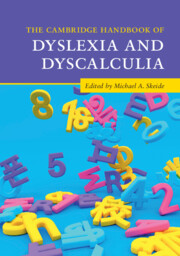Book contents
- The Cambridge Handbook of Dyslexia and Dyscalculia
- The Cambridge Handbook of Dyslexia and Dyscalculia
- Copyright page
- Contents
- Figures and Tables
- Contributors
- Acknowledgements
- General Introduction
- Part I Theoretical Frameworks and Computational Models
- Part II Cognitive Profiles and Behavioural Manifestations
- Part III Genetic and Environmental Influences
- Part IV Neurodevelopmental Foundations
- 8 Neurogenetic Insights into the Origins of Dyslexia and Dyscalculia
- 9 Longitudinal Neural Observation Studies of Dyslexia
- 10 Longitudinal Neural Observation Studies of Dyscalculia
- 11 Neuroplasticity in Response to Reading Intervention
- 12 Neuroplasticity in Response to Mathematical Intervention
- Summary: Neurodevelopmental Foundations
- Part V Gender, Ethnicity, and Socioeconomic Background
- Part VI Cultural Unity and Diversity
- Part VII Early Prediction
- Part VIII Intervention and Compensation
- Part IX Best Practice – Diagnostics and Prevention
- Part X Best Practice – Schooling and Educational Policy
- General Summary
- References
- Index
- References
10 - Longitudinal Neural Observation Studies of Dyscalculia
from Part IV - Neurodevelopmental Foundations
Published online by Cambridge University Press: 28 July 2022
- The Cambridge Handbook of Dyslexia and Dyscalculia
- The Cambridge Handbook of Dyslexia and Dyscalculia
- Copyright page
- Contents
- Figures and Tables
- Contributors
- Acknowledgements
- General Introduction
- Part I Theoretical Frameworks and Computational Models
- Part II Cognitive Profiles and Behavioural Manifestations
- Part III Genetic and Environmental Influences
- Part IV Neurodevelopmental Foundations
- 8 Neurogenetic Insights into the Origins of Dyslexia and Dyscalculia
- 9 Longitudinal Neural Observation Studies of Dyslexia
- 10 Longitudinal Neural Observation Studies of Dyscalculia
- 11 Neuroplasticity in Response to Reading Intervention
- 12 Neuroplasticity in Response to Mathematical Intervention
- Summary: Neurodevelopmental Foundations
- Part V Gender, Ethnicity, and Socioeconomic Background
- Part VI Cultural Unity and Diversity
- Part VII Early Prediction
- Part VIII Intervention and Compensation
- Part IX Best Practice – Diagnostics and Prevention
- Part X Best Practice – Schooling and Educational Policy
- General Summary
- References
- Index
- References
Summary
In this chapter, we summarize the current state of research that relates the inability to mentally operate with numbers to the development of brain mechanisms. Before looking at the details about longitudinal development of the neurocognitive underpinnings in numerical disorders we would like to briefly address the neural bases of typical numerical cognition and developmental dyscalculia. Here, we refer to the clinical classification of developmental dyscalculia, which defines it as a specific learning impairment affecting numerical cognition that emerges at a very early stage of development and cannot be explained by inappropriate schooling or lack of learning opportunities. Therefore, when we talk about developmental dyscalculia, we do not include acquired numerical disorders due to loss of an established ability (e.g. after brain damage). Rather, we focus on the inability to acquire numerical concepts or procedures due to developmental issues. Based on the knowledge generated in cross-sectional studies investigating numerical cognition, we elaborate on developmental changes in brain function and structure during typical development and in developmental dyscalculia. Finally, we discuss the predictive relation between brain characteristics and numerical skills.
- Type
- Chapter
- Information
- The Cambridge Handbook of Dyslexia and Dyscalculia , pp. 183 - 201Publisher: Cambridge University PressPrint publication year: 2022



